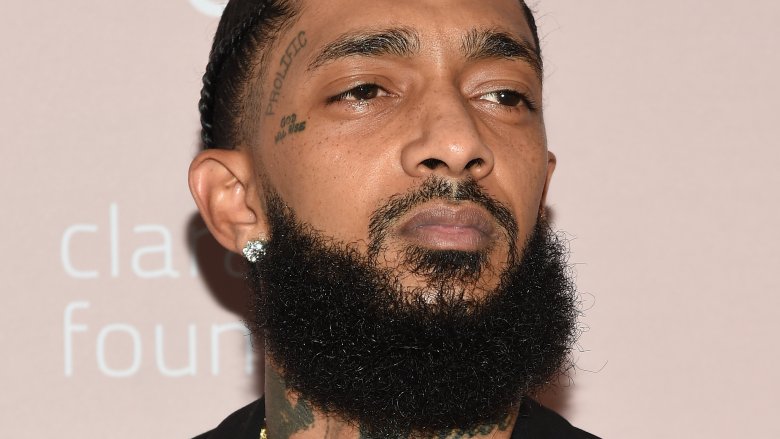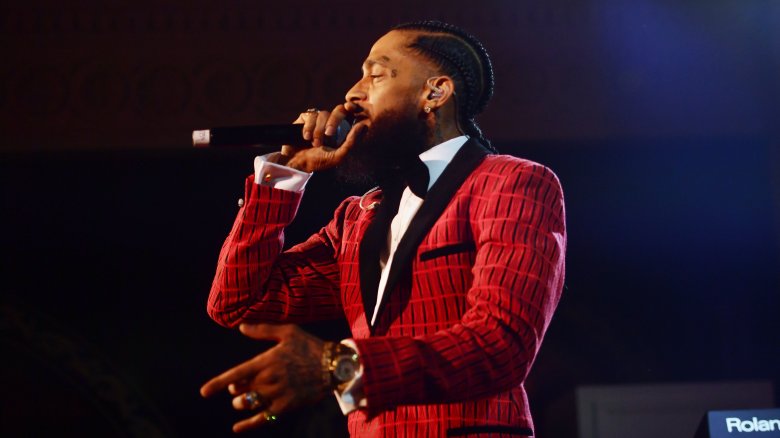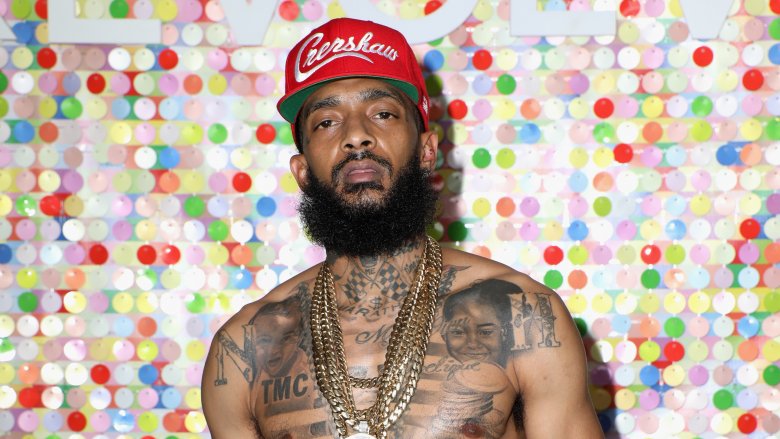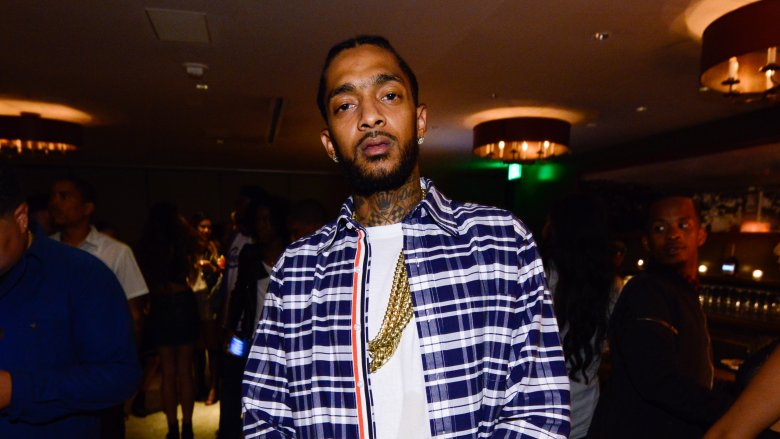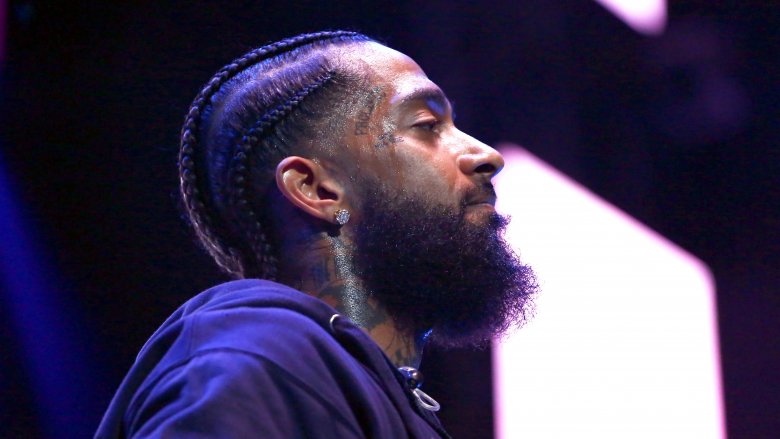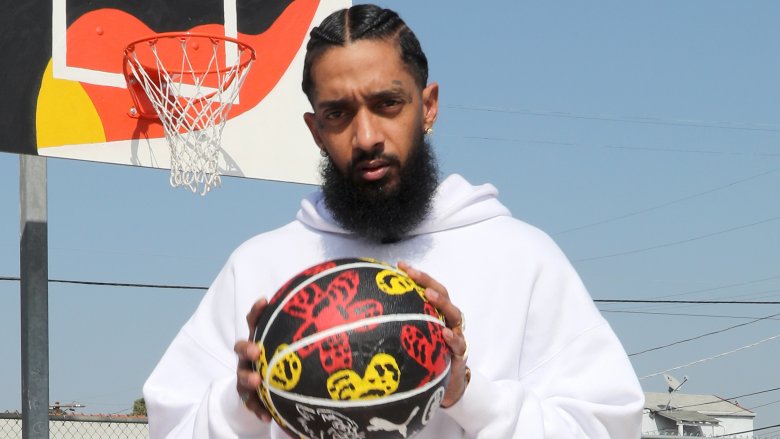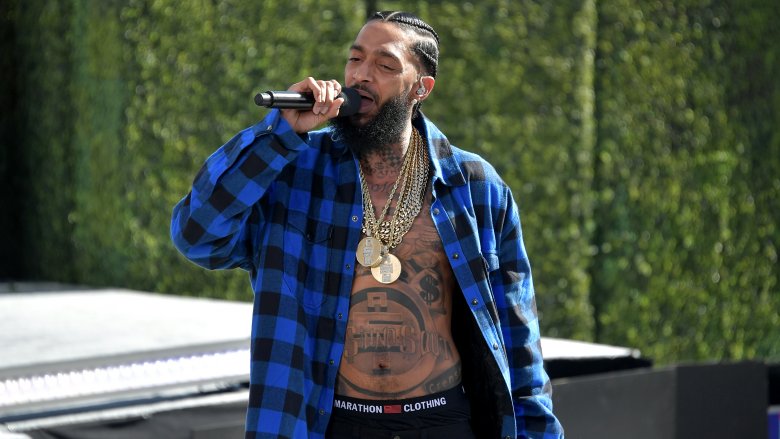Here's How Much Nipsey Hussle Was Really Worth
Born Ermias Asghedom, rapper and philanthropist Nipsey Hussle was tragically gunned down in front of The Marathon Clothing store, a retail business he co-created. "The philosophy of this retail space is to be an experience, and while you're in the process of the experience, you're surrounded by branded products," he explained in an interview with Billboard.
Hussle was a true entrepreneur, continually bringing unique marketing and business ideas to the rap game on his quest to make his vision a reality. In an interview with Complex, Hussle said he digested the lessons of hip-hop giants like Jay Z and Diddy and made them his own. "These are the moguls that built enterprise around their music," he explained. "That mentality of using the core business, which for us is music, and then building this enterprise around yourself; you create wealth when you empower your team with it, and you take the pressure off of your core business. You could do [music] out of the love when you got all these other things that take care of the bottom line."
His plan worked because, at the time of his unfortunate death, Hussle had amassed $8 million according to Celebrity Net Worth. Let's take a look at how he got there.
The $100 mixtape
Nipsey Hussle's outside of the box thinking and hustle (no pun intended) lead him to come up with a way to profit off his 2013 mixtape Crenshaw. According to Forbes, Hussle planned to release it on the mixtape download site, Datpiff, but a book changed his mind. "One of my mentors suggested I read a book called Contagious," the rapper told Forbes. "In the second chapter, a restaurant owner created the first $100 Philly cheesesteak and got ridiculed but got a ton of prominent people interested."
So with that marketing lesson learned, the then-unsigned rapper "made $100,000 by selling 1,000 copies" of the CD in less than 24 hours at a pop-up store in Los Angeles. Even Jay Z bought 100 copies. He also launched Proud2Pay, that rewards his "fans with concerts, priority access to new material, and one-of-a-kind gifts, like an old rap notebook or signed photo."
Hussle then used that money for expenses for his record label, All Money In No Money Out. "It's time we acknowledge what we all know: the music is free," he said. "We shouldn't force people to buy it, what we should do is create different methods to monetize the connection." We have to admit, that's pretty genius.
He created a record label, then major labels came to him
In November 2017, Nipsey Hussle signed a deal to partner his label, then-shortened to All Money In, with Atlantic Records for his first and only studio album Victory Lap. After a string of mixtapes, the album marked Hussle's first major commercial release, and it debuted at No. 4 on the Billboard 200 albums chart, selling 300,000 traditional copies and streaming 21,000 album equivalents. The album went on to earn the Crenshaw product a 2019 Grammy nomination for Best Rap Album.
Hussle sat down with Fader to discuss why he partnered with Atlantic after fiercely independent early career. "I was always trying to figure out what the strategy would be but to go into the next level of the game, you have to tap into a resource pool whether it's your own resources or a partnership or reinvesting," he explained. "The decision was really about me thinking about the message in the music and it deserves to have a global platform. Once I figured that out, it was just about what terms our deal would be on and being able to justify that request when we sit down."
Marathon Clothing was the first 'smartstore'
Nipsey Hussle opened his Marathon Clothing store in Los Angeles on June 17, 2017. However, it wasn't just "another retail brick and mortar," Billboard reports, but rather, "a smartstore where customers can purchase merch and use an app to preview exclusive content from the West Coast rapper."
Speaking to the publication, Hussle explained the concept and idea for the store. "So in order for me to keep the value of the retail brick and mortar, it has to be a unique experience. So the whole team sat with that for a couple years, and we were just trying to think, 'How can we create the organic experience?' I look at Supreme and it's a skate brand," he said. "They have a half-pipe in the middle of their store, and while you're shopping, you might hear some trucks scraping the rail, because they're back there skating. So I'm just thinking, 'What's the essence of the brand? What's the core of the brand?'"
He goes on to say, just like Disneyland, he wanted to create a space where the content is "surrounded by products." He planned to replicate the store "in the top 10 markets of the United States" to be "an urban Sanrio."
He co-created a business incubator
Not only did Nipsey Hussle invest in himself, but he also used his entrepreneurial spirit to invest in the underrepresented as well. Per CBS Los Angeles, the rapper and real estate investor David Gross financed the development of South Central L.A.'s Vector 90, "a co-working space and business incubator to help the next generation of business leaders." Opened in February 2018, Vector 90 also offers STEM (science, technology, engineering and mathematics) classes for kids, and according to the Los Angeles Times, the center hopes to "serve as a conduit between underrepresented groups and corporate partners in Silicon Valley and beyond."
"In our culture, there's a narrative that says, 'Follow the athletes, follow the entertainers,'" Hussle told the Los Angeles Times. "And that's cool but there should be something that says, 'Follow Elon Musk, follow [Mark] Zuckerberg.' I think that with me being influential as an artist and young and coming from the inner city, it makes sense for me to be one of the people that's waving that flag."
Not only will entrepreneurs have a space to work, the creators of the space would be potential investors. "Every year we're gonna be able to do a first round of seeding for one of the entrepreneurs," Hussle told Black Enterprise. "They can make a pitch and say, 'This is what I'm doing. This is what we need to take it to the next level,' and they can have access to investments in the same building."
He has 10 acting credits
In addition to his music and clothing label, Nipsey Hussle made cameos in film and television including on the pilot episode of the hit TV series, Crazy Ex-Girlfriend during the musical number "The Sexy Getting Ready Song." Per Entertainment Weekly's review of the episode, the scene is "a genius takedown of all the nonsense women do/are expected to do to look socially presentable and attractive." After he finished his rap, Hussle looks around the bathroom, and says, "This is some nasty a**, patriarchal bulls***. I gotta go apologize to some b******s. I'm forever changed by what I just seen."
Deadline writes, "In 2007, [Hussle] appeared in the Rich Newey-directed Bone Thugs-N-Harmony's semi-autobiographical film I Tried as well as the 2010 feature Caged Animal which also starred Ving Rhames, Gillie Da Kid and Robert Patrick." For a full list of Nipsey Hussle's acting credits, be sure to check out his official IMDb.
His music topped the streaming charts
Nipsey Hussle's music will continue to provide for his family, but unfortunately, the sharp spike in his streaming revenues came in the wake of his fatal shooting. TMZ reports that Hussle's catalog "has soared on Amazon and iTunes," with many of his older tracks "jumping up in position by as much as 500%." His debut, Grammy-nominated studio album, "Victory Lap," rose "a whopping 504,766%" to become "the #1 album on Amazon's Movers & Shakers list."
The media outlet goes on to report that "Nipsey's album and previous mixtapes actually occupy all four top slots on Amazon's Movers & Shakers list," and "'Victory Lap' has also jumped to #2 on Amazon's overall bestsellers in digital music." Over on iTunes, Victory Lap reached the second spot on its album chart, "and his mixtape, Crenshaw, has climbed to #12 on the list."
According to Billboard, Hussle's post-mortem album and song downloads "increased 2,776 percent in the U.S," selling "a combined 15,000 copies."

